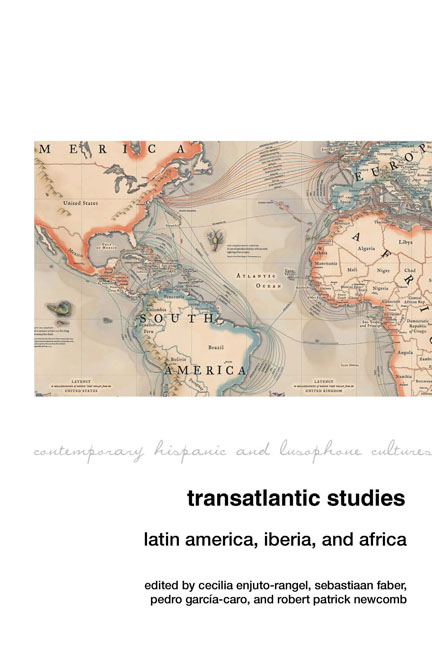Book contents
- Frontmatter
- Contents
- Introduction: Transatlantic Studies: Staking Out the Field
- Transatlantic Methodologies
- Transatlantic Linguistic Debates
- Transatlantic Displacement
- Transatlantic Memory
- Transatlantic Postcolonial Affinities
- Transatlantic Influence
- Epilogue: The Futureâif There Is OneâIs Transatlantic
- Index
1 - Transatlantic Coloniality in 1940s Cuba
- Frontmatter
- Contents
- Introduction: Transatlantic Studies: Staking Out the Field
- Transatlantic Methodologies
- Transatlantic Linguistic Debates
- Transatlantic Displacement
- Transatlantic Memory
- Transatlantic Postcolonial Affinities
- Transatlantic Influence
- Epilogue: The Futureâif There Is OneâIs Transatlantic
- Index
Summary
Transatlantic Studies is fundamentally a postcolonial, conceptual, and disciplinary relocation of the way we study the history and culture of the Americas and Spain. Instead of ignoring, erasing, justifying, or explaining away empire, exploitation, and genocide, Transatlantic Studies places the painful and lasting colonial history of the Iberian Peninsula and Latin America at its center. Once it is accepted that the conquest and colonization of the Americas are fundamental for the nations, states, and cultures on both sides of the Atlantic, Transatlantic Studies can begin to trace the ways in which the multiple cultures of the American and Iberian world have processed these historical events, and analyze their consequences today.
In this essay my interest will be focused on Cuba and the ways in which the construction of a postcolonial culture moves paradoxically, and in the eyes of some critics necessarily, to recover a whitewashed colonial past. I will elucidate why artists such as Virgilio Pinera (1912–79) and Wilfredo Lam (1902–82) have inhabited the critical margins of the Cuban canon. By taking a transatlantic perspective that contrasts their cosmopolitan approaches to the visual arts and poetry, and by placing them in tension with local critical discourses on art, it becomes apparent how the colonial imaginary and its fundamental racism provide the scaffold for the rejection of art that was considered not white enough, or Christian enough, to be authentically Cuban. The essay will examine Virgilio Pinera's poem “La isla en peso,” which was published in 1943, the same year that painter Wilfredo Lam's masterpiece La jungla was exhibited for the first time. Both works redefined and worked against the contemporary hegemonic view of Cuban art and culture by creating an alternative view closer to the postcolonial multicultural and multiracial reality of Cuba at the time. By using Afro-Caribbean elements as centerpieces of their works, and pairing them with European techniques, Piñera and Lam broke the taboo of the transatlantic history of colonialism and slavery. My goal here is to map the ways in which colonial discourse was still latent in the practice of artistic criticism.
- Type
- Chapter
- Information
- Transatlantic StudiesLatin America, Iberia, and Africa, pp. 21 - 29Publisher: Liverpool University PressPrint publication year: 2019



